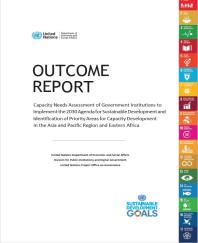Publications
Outcome Report of Capacity Needs Assessment of Government Institutions to Implement the 2030 Agenda for Sustainable Development and Identification of Priority Areas for Capacity Development in the Asia and Pacific Region and Eastern Africa
August 22, 2019

This Capacity Needs Assessment of Governmental Institutions to Implement the 2030 Agenda for Sustainable Development: Identification of Priority Areas for Capacity Development in the Asia and Pacific and Eastern Africa Regions (hereafter “Capacity Needs Assessment”) was conducted by the Division for Public Institutions and Digital Government (DPIDG) of the United Nations Department of Economic and Social Affairs (UN DESA), through its UN Project Office on Governance (UNPOG), from 2017 to 2018.
The main objective of the Capacity Needs Assessment is to assess public institutions’ capacity needs and priorities in implementing the 2030 Agenda for Sustainable Development in 47 Member States in Asia and the Pacific and Eastern Africa with focus on three group of countries: Small Island Developing States (SIDS), Least Developed Countries (LDCs)/Landlocked Developing Countries (LLDCs) and Low- and Middle-Income Countries (MICs). This exercise helps identify institutional capacity gaps, challenges and capacity needs in developing countries for achieving the 2030 Agenda and implementing the Sustainable Development Goals (SDGs). The outcome of this Capacity Needs Assessment could help UN DESA/DPIDG to better develop capacity development programme activities in line with the demands of the Member States and contribute to the strengthening of capacities of public institutions in developing countries, to translate the SDGs into strategies and programmes at the country level in achieving the SDGs.


